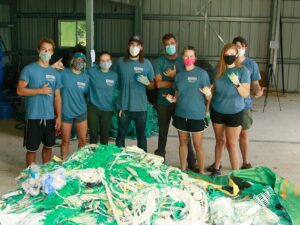
Hawai’i Pacific University’s Center for Marine Debris Research has launched a project to remove derelict fishing gear from the ocean.
A bounty will be paid to eligible commercial fishers to remove derelict fishing gear at-sea before it strikes Hawai’i’s coral reefs. Fishers registered in the bounty project will be paid between $1 to $3 per dry pound for derelict fishing gear found at sea and brought back to Oahu.
Hawai’i Pacific is partnering with the Hawai’i Longline Association and Hawai’i’s Department of Land and Natural Resources’ Division of Aquatic Resources on the project. The goal is to remove 100 metric tons (220,462 pounds) of derelict fishing gear from the Pacific Ocean over two years.
The program is partially supported by the National Oceanic and Atmospheric Administration’s Marine Debris Program.
Derelict fishing gear is one of the most harmful forms of marine debris to marine animals and habitats. It’s primarily made of plastic and constitutes most of the plastic pollution washing ashore on Hawaiʻi’s beaches.
Before reaching the shoreline, ocean currents tangle up derelict fishing gear into large masses. The masses of plastic debris can entangle and drown marine animals, as well as smother and kill Hawaiʻi’s coral reefs as they drift to the shoreline.
University staff, students, and volunteers will collect the debris from fishers at the dock and document, measure and weigh debris in the net shed. The debris will be repurposed first by artists and educators and recycling researchers. The remaining debris will be converted to electricity for the City and County of Honolulu through the Nets-to-Energy Program with assistance from Schnitzer Steel Hawai‘i Corporation and H-Power (Covanta).
Hawai’i Pacific previously ran a trial project from 2020 to 2021 with the Honolulu-based longline fleet. A current study at HPU is nearing its completion and initial reports indicate that most of the derelict fishing gear washing ashore in the islands is not from Hawaiʻi-based fisheries.
According to the university, findings are to be used to discuss best practices with those fisheries in hopes of preventing the loss of fishing gear in the first place.
More information on the current project, including requirements, registration and safe removal practices, is available on the university’s website: https://tinyurl.com/556xrdrc.
